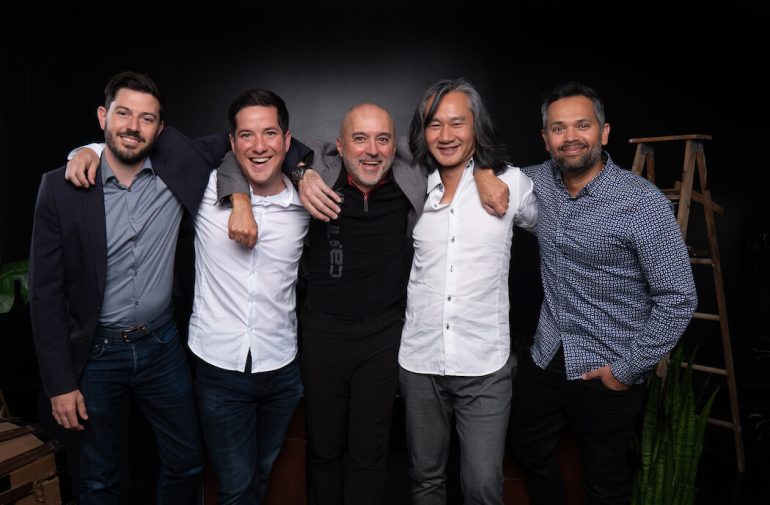Panache Ventures, one of Canada’s most active early-stage investors, has doubled up for its second fund.
The pre-seed and seed stage firm has embarked on Fund II with $100 million CAD in fresh capital, just shy of double the $58 million raised for its first fund.
Originally launched in 2018 by a team that came out of 500 Startups Canada, Panache’s stated goal at the time was to become “the most active and best-performing fund of its kind in the country.” It’s a feat that Panache has been able to achieve in the last five years, according to Canadian Venture Capital and Private Equity Association (CVCA) data. Panache has invested in 100 companies to date, including Certn, Clutch, MobSquad, and Dooly.
“We have a mission to advance the early-stage technology ecosystem in Canada.”
The firm is one of few large, institutionalized venture funds in Canada to focus on pre-seed and seed capital. And while market economics lead to a renewed focus on seed-stage, investors in the space argue Canada needs a stronger focus on early-stage companies – pre-seed in particular.
“We have that view that it’s not just economics driven, it’s [that] we have a mission to advance the early-stage technology ecosystem in Canada,” co-founder and partner Patrick Lor told BetaKit in an interview.
Many of the limited partners (LPs) for Panache’s second fund are return investors, including the likes of Alberta Enterprise Corporation, Bank of Montreal, Investissement Québec, and Telus Ventures. Other investors include the Ontario Capital Growth Corporation, and undisclosed “top” entrepreneurs, executives, and family offices.
Fund II brings Panache’s total funds under management to more than $150 million. Panache initially had a target of $75 million for its second fund, but after what Lor called strong investor interest, the firm increased that number to $100 million.
Lor noted that the fund continues to be in discussion with additional LPs and told BetaKit there is a “good possibility” that Fund II goes beyond its current size.
He argued that this interest comes from Panache’s Fund I performance. Of the 100 companies that Panache has invested in, the firm has had at least three exits, including proptech Lane, and Flinks, which sold a majority ownership stake to National Bank last year.
RELATED: Panache Ventures acquires Commonwealth Ventures, launches Fund II
The venture firm also claims a portfolio where 52 percent of the co-founders are persons of colour, and its investment in women-led startups is 1.8 times greater than the national average for Canadian venture capital.
While Fund II will continue Panache’s Canada-wide, early-stage investment thesis from its first fund, the makeup of the team looks different.
Panache was originally launched by Lor, Mike Cegelski, David Dufresne, and Nicolas Bouchard – all of whom came from 500 Startups Canada after it fell apart due to accusations of sexual misconduct by 500 Startups founder Dave McClure.
Over the past year, both Dufresne and Bouchard left Panache, with the latter joining Inertia Ventures. In turn, Panache brought on Chris Neumann as well as Scott Loong as partners. Cegelski has also stepped away from the day-to-day management of Panache in favour of taking on a more visionary role as chairman.
Neumann, who joined Panache in September 2021 after the firm acquired San Francisco-based founder bootcamp Commonwealth Ventures, also has ties to 500 Startups, having served as a venture partner and entrepreneur-in-residence in 2017.
Panache now consists of four partners: Lor, Loong, Neumann, and Prashant Matta, who joined in 2018 as Panache’s Toronto partner.

Those partners have already been active in deploying capital from Fund II, the majority of which (around $75 million) was closed in the spring. Panache has made 12 investments to date out of Fund II, into companies like OneVest, Big Whale Labs, SureBright, and HyperComply. The firm plans to make around 20 investments per year.
The timing of Panache’s second fund is notable as the current economic climate has led to an uptick in seed-stage investments in Canada.
As venture capitalists become more cautious about putting capital into later-stage companies that may not be delivering in their go-to-market strategy, some have argued that seed-stage investing has become more attractive.
Speaking to CVCA data from the first half of 2020, CVCA vice president of research and product, Christiane Wherry, noted that “seed stage companies are the furthest from the public markets and its current volatility, and are therefore relatively insulated from the slowdown experienced by the rest of the economy.”
“What you’re seeing in a bunch of markets today is the washout of momentum investors.”
According to CVCA data, almost half of all transactions in the first half of 2022 were made at the seed stage, with records set for both amount invested and the number of deals. This comes after concerns over the past year that later-stage deals were leaving earlier-stage companies in the dust and with more limited access to capital.
Sandi Gilbert, CEO of Intergen and formerly a board member of The National Angel Capital Organization (NACO), argued that what is taking place is part of a regular cycle where seed investors follow their investments upstream, leaving gaps for early-stage companies.
“The next generation or the next group of pre-seed [companies], it feels like there’s no … money for those,” she said. “And then, all of a sudden, the early funded seed companies are beyond the reach of a seed investors, so then the seed investor goes and finds more deals.”
That cycle is exactly what Panache is trying to avoid. While the company holds a certain amount of its fund for follow-on, and still has follow-on capital from Fund I to deploy, Lor said Panache’s thesis is about not getting caught in the hype.
“What you’re seeing in a bunch of markets today is the washout of momentum investors,” he told BetaKit. “They’re not necessarily there with a long-term view. They just invest in what’s hot.”
Lor argued that Panache sees early-stage investing in Canada not as a momentum play but as “a structural and foundational play.”
RELATED: Tracking the tech downturn across Canada with data
Whereas Canadian venture firms like Inovia Capital and Georgian have moved upstream in recent years with later-stage funds, Panache’s fund II is about doubling down on its existing thesis: building up pre-seed and seed companies in Canada.
Lor likened the idea to the need for elementary schools. “If you believe that there’s always going to be a need for elementary schools, almost no matter what, save for a doomsday scenario, you will continue to invest in that over time … just almost ignoring the momentum, because you’ll always need a pipeline of great companies.”
That need for early-stage investment in Canada remains especially clear when looking at pre-seed investments this year. CVCA data showed that while there was a steady rise of pre-seed deals since late 2020, that has changed as the tightened economy has led to uncertainty.
“We only invest in a very tiny fraction of the companies that are being founded in Canada.”
Gilbert noted that given that pre-seed deals tend to be led by angel investors, one reason for the slowdown could be individual investors tightening their belts as the public markets fall.
Alex Norman, a partner at seed-stage investment firm N49P, echoed that sentiment, arguing that a sizable gap remains in early-stage investment in Canada.
“There’s a misconception about the early stage at the government level, [and] the market levels where it says [early-stage investing] had been solved in Canada. I don’t think it’s ever truly been solved,” he told BetaKit.
Panache is among a group of early-stage institutional investors in Canada, which includes Rhino, Anges Québec, Real Ventures, Golden Ventures, and Garage Capital, among others. And while there has been a trend in recent years of institutionalization of angel investors, with the likes of The51, Thin Air, and Sandpiper, early-stage investors that BetaKit spoke with argue there are still not enough investors to meet early-stage demand.
Neumann said that “there aren’t enough options yet” when Panache is looking to refer companies it may not make deals with to like-minded investors.
In order to continue being one of Canada’s most active investors, Panache is launching what it’s calling Panache Academy. The Academy will provide founder education and support on scale, and is the culmination of the firm’s purchase of Commonwealth Ventures.
RELATED: Impression Ventures secures $64 million for fourth fund, continues to bet on seed-stage FinTech
Neumann, who was the founder and CEO of Commonwealth, leads Panache’s founder education efforts, and has also re-worked the firm’s internal infrastructure. He explained that in order to increase Panache’s capacity in a sustainable way the firm has focused on making it as easy as possible to keep track of deals across the investment process.
To further its goal of supporting the entire early-stage ecosystem in Canada, Panache hopes to expand the Academy beyond its portfolio companies at some point in the future.
“We only invest in a very tiny fraction of the companies that are being founded in Canada,” said Neumann. “So, we have a shared mission, not only to generate financial returns for our investors, but also to have as big of a positive impact as we possibly can across Canada as really the only and the leading national early-stage fund.”
Feature image courtesy of Panache Ventures.


